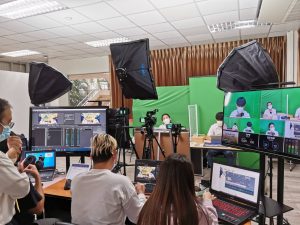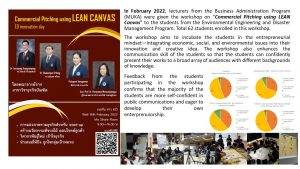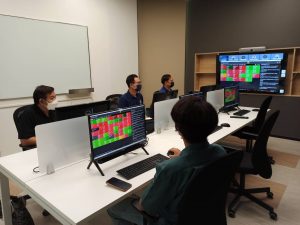Rapidly changing of the world or VUCA world, knowledge and skills adopted in teaching and learning in the class may not be enough. Current jobs may be disrupted in the near future or their business flows need to significantly change to cope with 21st century skills. New jobs may be created in order to fulfill the gaps with disruptive change in customer experience or customer journey. Global imbalances in many aspects; such as social, environmental, digital, and life-work imbalances, may cause students and graduates to adapt themselves in order to minimize the gaps and be capable of following the trends. Students need to search areas that they are interested. They need to understand the diversity in many aspects and know how to deal or corperate with other people. University campus should be a place for supporting students to make experiments or trials in order to encourage students to have entrepreneurial mindset.
Enhanced policy to improve student skills in order to become a global citizen and global talent in the near future is a need. Therefore, Mahidol University has already set the required skills for students to be achieved in 5 domains or called as “HIDEF” which relates to health literacy (H), internationalization (I), digital literacy (D), environmental literacy (E), and financial literacy (F). Some activities may be counted for more than one domain. Students need to participate the HIDEF activities and volunteer activities, based on their interests, not less than 100 hours during their study.
Health Literacy (H)
Work-life balance becomes an essential part for present living. Attempt has been made to encourage students to understand and practice basic needs relating to preventive and corrective measures for good health and well-being.
Typical examples of extracurricular activities in health literacy are as follows:
Basic Life Supports: This extracurricular activity has been conducted every year in order to encourage students to understand about basic life supports. Theoretically, basic life supports could be online learnt from MUX. Once students passed the online examination, they could practically learn how to do cardiopulmonary resuscitation (CPR) and use automatic external defibrillator (AED) properly.
Internationalization (I)
People from different countries behave with variously cultural backgrounds, communicate with different languages, and interact with diverse ways of thinking and beliefs. In order to become global citizen, students need to be aware and interact with people from diverse background. Therefore, MUKA provides many extracurricular activities to be chosen according to student interests.
Typical examples of extracurricular activities in internationalization are as follows:
Chinese Language for Communication:
Korean Language:
English Language for Communication
International Cultural Exchange
Digital Literacy (D)
In a digital era, rapid change in digital technology causes digital imbalance in society. Students need to understand and catch up with the digital awareness in order to minimize problems arising from misuse technology. MUKA also provides a digital learning experience space for students to learn, practice, and apply the digital technology in their fields or daily life.
Typical examples of extracurricular activities in digital literacy are as follows:
Environmental Literacy (E)
Insufficient awareness in involving people to preserve natural and environmental resources is one of the main reasons for environmental imbalance. Therefore, our MUKA encourages students to participate in many activities in order to understand and practice how to involve in sustain natural and environmental resources properly. Many facilities; such as digital herbarium, bird watching, check dam learning station, geoscience museum, geological park, are also provided for students to enhance environmental experience.
Typical examples of extracurricular activities in environmental literacy are as follows:
Nature Game: This activity uses game technique as a learning approach to encourage students and learners to understand the surrounding nature and environment in MUKA campus and be aware of participating in conservation of nature and environment.
VDO Clip Contest on Conservation of Energy and Environment
Financial Literacy (F)
Understanding investment and financial products will help students to plan and manage daily-life expense, saving, debt and investment for future efficiently. These will be a financial immune for students in the near future to improve their quality of life. MUKA also provides investment lab facility which is a learning space for students to understand and practice fundamental and intermediate investment.
Apart from that, entrepreneurial mindset needs to be embedded for students so that they are able to make decision based on the identification and management of intelligent risks or negative impacts from their planned and unplanned actions.
Typical examples of extracurricular activities in financial literacy are as follows:
Commercial Pitching using LEAN Canvas
International Entrepreneurship Program
Investment using ASPEN Program
Simulation Classroom for new Investors



